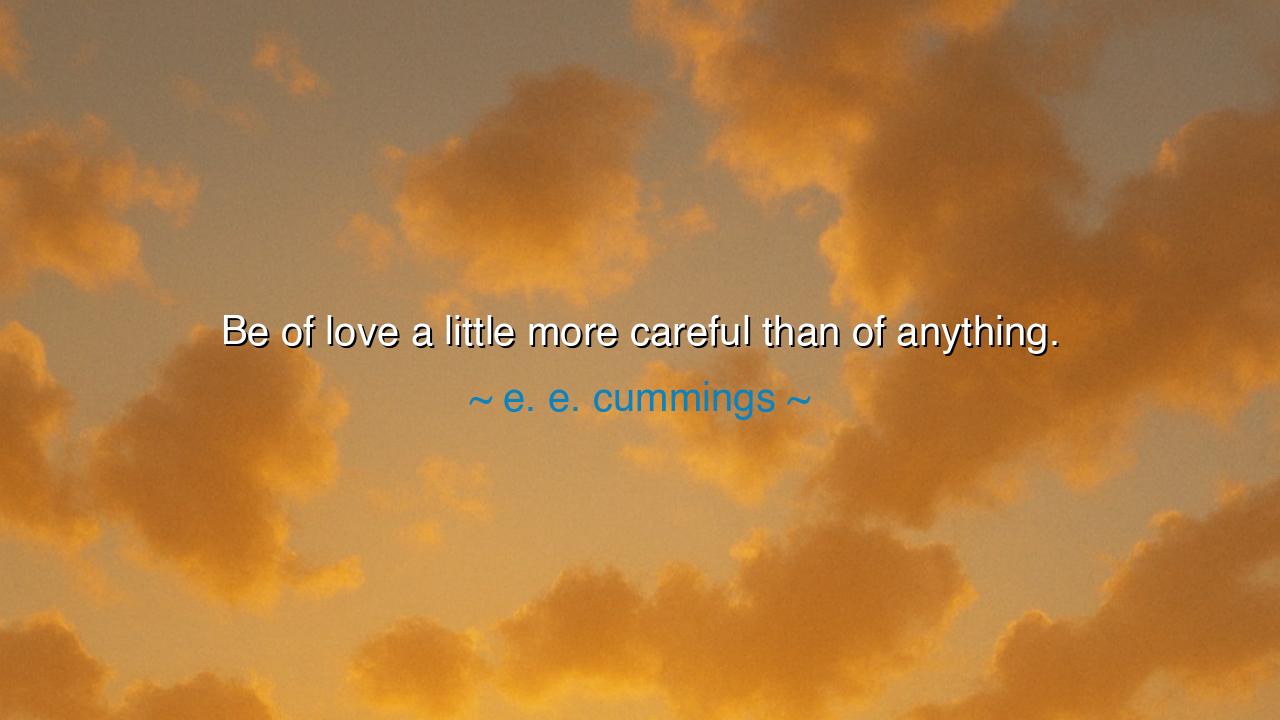
Be of love a little more careful than of anything.






e.e. cummings, the poet whose words danced between joy and despair, offers us a vital piece of advice: “Be of love a little more careful than of anything.” This simple yet profound command urges us to treat love not as a casual emotion, but as a force of great responsibility and significance. To love is to open oneself to another, to extend trust, and to give a part of oneself freely. It is not something to be taken lightly, for love carries with it the potential for both immense joy and profound heartbreak. Cummings reminds us that in loving, we must be thoughtful, deliberate, and protective, guarding not just our own hearts, but the hearts of others. Love is a treasure, and like any treasure, it must be handled with care.
The ancients also understood the sacred responsibility of love. Plato, in his Symposium, described love as the pursuit of beauty and truth, a force that could elevate the soul. But for Plato, true love was not simply about passion or affection—it was about the wisdom of connecting with the divine through another. Socrates believed that love was a pathway toward virtue and self-awareness. It required not only the willingness to open oneself to another but also the wisdom to recognize love’s power to shape one’s soul. In this sense, the ancients knew that love was not something to be entered into lightly. It required care, thoughtfulness, and a commitment to both growth and sacrifice. To love is to step onto a path that leads us to greater understanding and, sometimes, greater vulnerability.
Consider, O children, the tale of Odysseus and his wife, Penelope, whose love endured across the trials of war and time. Odysseus, returning from the Trojan War, faced many challenges, yet it was his deep love for Penelope that kept him steadfast in his resolve to return home. Penelope, too, exhibited great care in her love. For twenty years, she waited, faithful and unwavering, knowing that love’s true strength is not in the immediate joy it brings, but in the endurance, the patience, and the care that it requires. Their love was built not on moments of passion, but on shared wisdom—the wisdom to care for one another even in absence, to protect the bond that connected them, and to understand that true love demands not just feeling, but action and sacrifice.
Similarly, consider the love of King David for Jonathan, a love that transcended the boundaries of friendship and became a model for selfless devotion. Their bond, though not of romantic love, was one marked by a deep care for one another, even in the face of danger. When King Saul, Jonathan’s father, sought to kill David, it was Jonathan who protected him, showing that love’s true strength is not in grand gestures, but in the quiet acts of loyalty and sacrifice. Their love was not reckless or blind; it was grounded in wisdom and awareness, for they understood that love requires protection, especially when it faces forces of division and harm. Jonathan’s care for David exemplified the caution that Cummings speaks of—love’s true power lies not in its absence of caution but in its careful, deliberate presence.
In the modern world, we see this lesson reflected in Mahatma Gandhi, whose love for his country and his people was an act of careful, thoughtful deliberation. His commitment to nonviolent resistance was not just about opposing British rule, but about showing the world that love, even in the face of immense suffering, can transform and transcend. Gandhi knew that love for his people required patience, sacrifice, and careful planning. He did not rush into rebellion, but instead carefully crafted his approach, understanding that love for his fellow countrymen meant protecting them from harm and guiding them toward freedom with wisdom, not with rashness. Gandhi’s love was not merely about passion, but about understanding the long-term consequences of his actions and the responsibility that came with his love for his people.
Cummings’ message, then, is not to love with fear, but to love with awareness. To love fully and deeply requires more than mere passion—it demands care, attention, and responsibility. Love is a force that, when not treated with care, can lead to pain, but when nurtured with respect and deliberation, it becomes the most powerful force in the world. It is a force that can heal, that can inspire, and that can transform, but only when we take the time to guard it and handle it with the tenderness it deserves.
O children of the future, take this lesson to heart: love with care. Love those around you not just with intensity, but with the wisdom to recognize its power. Protect your love and the love of others by being deliberate, by choosing when and how to give it, and by respecting its power. Do not rush into love without considering its potential to transform, to uplift, and, sometimes, to hurt. But do not withhold it either, for love is the very essence of our humanity. Be careful, then, with your love, for in it lies both your strength and your vulnerability. By loving with care, you allow love to grow, endure, and become a force that shapes the world around you. Love as the ancients did—with wisdom, with thought, and with devotion.






AAdministratorAdministrator
Welcome, honored guests. Please leave a comment, we will respond soon